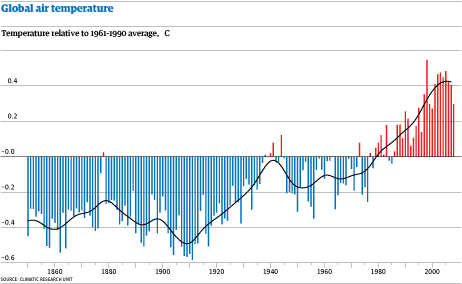
World will warm faster than predicted in next five
years, study warns
Jul 27, 2009 - Duncan Clark - Guardian.co.uk
New estimate based on the forthcoming upturn in solar
activity and El Niño southern oscillation cycles is
expected to silence global warming sceptics

The world faces record-breaking temperatures as the
sun's activity increases, leading the planet to heat
up significantly faster than scientists had predicted
for the next five years, according to a study.
The hottest year on record was 1998, and the relatively
cool years since have led to some global warming sceptics
claiming that temperatures have levelled off or started
to decline. But new research firmly rejects that argument.
The research, to be published in Geophysical Research
Letters, was carried out by Judith Lean, of the US
Naval Research Laboratory, and David Rind, of Nasa's
Goddard Institute for Space Studies.
The work is the first to assess the combined impact
on global temperature of four factors: human influences
such as CO2 and aerosol emissions; heating from the
sun; volcanic activity and the El Niño southern oscillation,
the phenomenon by which the Pacific Ocean flips between
warmer and cooler states every few years.
The analysis shows the relative stability in global
temperatures in the last seven years is explained
primarily by the decline in incoming sunlight associated
with the downward phase of the 11-year solar cycle,
together with a lack of strong El Niño events. These
trends have masked the warming caused by CO2 and other
greenhouse gases.
As solar activity picks up again in the coming years,
the research suggests, temperatures will shoot up
at 150% of the rate predicted by the UN's Intergovernmental
Panel on Climate Change. Lean and Rind's research
also sheds light on the extreme average temperature
in 1998. The paper confirms that the temperature spike
that year was caused primarily by a very strong El
Niño episode. A future episode could be expected to
create a spike of equivalent magnitude on top of an
even higher baseline, thus shattering the 1998 record.
The study comes within days of announcements from
climatologists that the world is entering a new El
Niño warm spell. This suggests that temperature rises
in the next year could be even more marked than Lean
and Rind's paper suggests. A particularly hot autumn
and winter could add to the pressure on policy makers
to reach a meaningful deal at December's climate-change
negotiations in Copenhagen.
Bob Henson, of the National Centre for Atmospheric
Research in Colorado, said: "To claim that global
temperatures have cooled since 1998 and therefore
that man-made climate change isn't happening is a
bit like saying spring has gone away when you have
a mild week after a scorching Easter." Temperature
highs and lows
1998
Hottest year of the millennium
Caused by a major El Niño event. The climate phenomenon
results from warming of the tropical Pacific and causes
heatwaves, droughts and flooding around the world.
The 1998 event caused 16% of the world's coral reefs
to die.
1957
Most sunspots in a year since 1778
The sun's activity waxes and wanes on an 11-year
cycle. The late 1950s saw a peak in activity and were
relatively warm years for the period.
1601
Coldest year of the millennium
Ash from the huge eruption the previous year of a
Peruvian volcano called Huaynaputina blocked out the
sun. The volcanic winter caused Russia's worst famine,
with a third of the population dying, and disrupted
agriculture from China to France.

|



